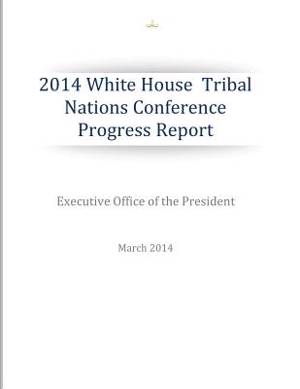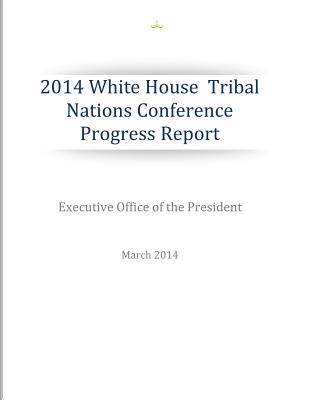
- Afhalen na 1 uur in een winkel met voorraad
- Gratis thuislevering in België vanaf € 30
- Ruim aanbod met 7 miljoen producten
- Afhalen na 1 uur in een winkel met voorraad
- Gratis thuislevering in België vanaf € 30
- Ruim aanbod met 7 miljoen producten
Zoeken
2014 White House Tribal Nations Conference Progress Report
Executive Office of the President
Paperback | Engels
€ 34,95
+ 69 punten
Omschrijving
The President considers the government-to-government relationship with Indian tribes a lasting covenant to be nourished and strengthened. To this end, engagement, consultation, and interagency collaboration are critical to supporting tribes in building stronger tribal communities. In 2013, the White House Tribal Nations Conference focused on the newly established White House Council on Native American Affairs. The Council is responsible for coordinating the U.S. government's engagement and partnership with tribes in order to promote more prosperous and resilient Native American communities. This year, tribal leaders were provided the opportunity to directly engage with the Council during the plenary session of the Conference to not only voice their concerns but also propose solutions to strengthen the Administration's tribal policies.This year, the President made significant enhancements to tribal self-government and self-determination. In January, the President signed an amendment to the Stafford Act which gives tribes the option to directly request Federal emergency assistance when natural disasters strike their homelands. In March, the President signed the Violence Against Women Reauthorization Act, which grants tribal courts the right to exercise their sovereign power to prosecute those who commit acts of domestic violence in Indian Country. And this November, the President announced the State, Local, and Tribal Leaders Task Force on Climate Preparedness and Resilience. The task force, comprised of tribal officials along with national, state, and local authorities, advises the Federal government on key actions it can take to support local preparedness to the impacts of climate change.The Administration's commitment to tribal consultation and collaboration has led to substantial policy achievements and a much improved partnership with tribes. While much progress has been made, the President recognizes that we have much more work to do. The President and his Administration look forward to working with tribal leaders to advance Indian issues through executive actions that result in meaningful and lasting change in Indian Country. The President also looks forward to making a trip to Indian Country in 2014, a commitment made during the Tribal Nations Conference Plenary Session in response to overwhelming tribal requests.
Specificaties
Betrokkenen
- Auteur(s):
- Uitgeverij:
Inhoud
- Aantal bladzijden:
- 52
- Taal:
- Engels
Eigenschappen
- Productcode (EAN):
- 9781499137347
- Verschijningsdatum:
- 14/04/2014
- Uitvoering:
- Paperback
- Formaat:
- Trade paperback (VS)
- Afmetingen:
- 216 mm x 279 mm
- Gewicht:
- 145 g

Alleen bij Standaard Boekhandel
+ 69 punten op je klantenkaart van Standaard Boekhandel
Beoordelingen
We publiceren alleen reviews die voldoen aan de voorwaarden voor reviews. Bekijk onze voorwaarden voor reviews.











